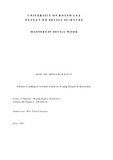Factors leading to alcohol abuse by young people in Botswana

View/
Date
2015-06-01Author
Matwetwe, Martha N.
Rights holder
University of BotswanaType
Masters Thesis/DissertationMetadata
Show full item recordAbstract
This study explores factors leading to alcohol abuse by young people with particular reference to Botswana. Youth is the period when an individual experiences physical, psychological, and social changes. In other words, it is a transitional stage to adulthood and it presents many challenges on biological, physical, social, psychological, and emotional levels. The objectives of this study were to explore the connection between parental influence and alcohol abuse among the youth; to interrogate the significance of peer relationships with regard to alcohol abuse among young people; to identify the relationship between socio-economic status and alcohol use and abuse among the youth; and to consider the relevance of the findings of international (and specifically African) studies to the situation in Botswana. The social learning theory developed by Bandura (1977) was used as the theoretical framework. According to this theory alcohol use and abuse is learned behaviour and factors contributing to that learning process are attention paid to the model; retention of observations; motor reproduction or replication; reinforcement or reward; and the environment or milieu, which helps to shape the behaviour. Literature was reviewed in books, articles, journals, and via the internet. Other information was collected from organizations such as the Ministry of Health, the National AIDS Coordinating Agency (NACA), and the Health and Wellness Centre at the University of Botswana.
The sources indicated that major factors leading to alcohol abuse among the youth are: parental influence, peer pressure, and socio-economic status. Furthermore, alcohol abuse can result in mental and physical ill health and contribute to, and be affected by, violence, unemployment, and poverty.
